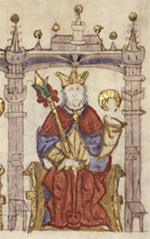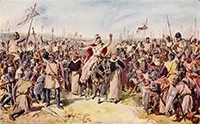King Dinis of Portugal
Dinis was King of Portugal for 46 years in the late 13th and early 14th Centuries. He advanced the kingdom economically and politically. He was born on Oct. 9, 1261, in Lisbon. His father was the reigning monarch, King Afonso III, and his mother was Beatrice of Castile. 
When Dinis was old enough, his father involved him in governmental decision-making. Thus, he had some experience at this when his father died, in 1279. Dinis, not yet 18, took the throne, on February 6. He inherited a struggle that his father had kept up with the Catholic Church and that had led to Afonso's being excommunicated. Dinis agreed to Rome's demands and signed the Concordat of Forty Articles with Pope Nicholas V, finishing the struggle. Also in the religious vein, he gave safe haven to a number of Knights Templar who sought asylum from persecution in France in the form of a similar organization, the Order of Christ, created in 1319. Dinis married Isabella of Aragon in 1281. They had two children: Constança (1290) and Afonso (1291). Dinis's father had conquered the Algarve, the last remaining Moor-held lands in what is now Portugal, and had kept the peace with the neighboring Spanish kingdoms, so Dinis inherited a kingdom relatively at peace. A blowup with Castile over the towns of Moura and Serpa ended after a short time, and in 1297 peace reigned anew, cemented in a treaty with Ferdinand IV of Castile, who was happy enough to gain the two towns and agreed to respect the border from thereon. With the borders secure, Dinis looked inward, strengthening the country's infrastructure and economy. He invested his crown's finances in the building of new towns and castles, and he financed efforts at finding and mining deposits of copper, iron, silver, and tin–sending excesses overseas in order to create a positive trade balance. Backing up all of this was the standardization of the law, which was to be written in the state language, Portuguese. Dinis and his wife, Isabella, had a special desire to help the poor succeed and together worked to found and finance instruments of social enterprise. Dinis also took a keen interest in agriculture, embarking on a program of land redistribution and farming finance and anticipating a rise in coastal waters and sands by encouraging the planting of a pine forest near Leiria. He became known as the Farmer King. To accommodate the increase in production, he established a number of town markets, which did business on a regular basis. To keep the borders secure, Dinis organized in 1317 what became the Portuguese navy, under the guidance of Micer Manuel Pezagno, a sailor and admiral from Genoa. He also set up the first marine insurance in Europe, in the form of a fund titled the Bolsa de Comérico. Dinis had an interest in literature and wrote a handful of books, on hunting and science. His output included books of poetry. His cultural prowess extended to music. He wrote many songs; manuscripts of more than 130 exist to this day. The king also encouraged learning in others. He founded the University of Lisbon in 1290. 
A succession struggle punctuated the last years of his reign. He had two sons named Afonso. The older was the son of Dinis's wife, Isabella. The younger Afonso was the son of another woman and so, technically, not in line to the throne. The king didn't help matters by publicly stating his preference for the younger Afonso. The two claimants fought each other for the privilege, in what might be termed a civil war, for two years. According to multiple sources, at one point, Queen Isabella prevented a major confrontation between the two sides by sitting atop a mule in between the two armies, forcing them to negotiate. Afonso the older ultimately prevailed, and it was he who became the new king when Dinis died on Jan. 7, 1325, in Santarém.
|
|
Social Studies for Kids
copyright 2002–2026
David White




